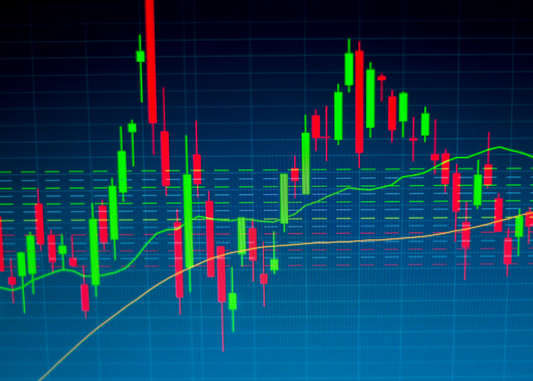What is cryptocurrency?

A cryptocurrency is a digital or virtual currency that uses cryptography to secure and verify transactions and control the creation of new currency units. Because they only exist digitally, cryptocurrencies do not have a physical form like notes or coins.
Unlike traditional currencies, which are typically issued and governed by a central authority, such as the US Federal Reserve or the European Central Bank, cryptocurrencies are decentralised. This means they operate independently of a central bank and are instead managed by a network of computers around the world.
The first cryptocurrency and the largest in terms of market capitalisation is Bitcoin. It was created in 2009 by an individual or group under the pseudonym Satoshi Nakamoto, and since then, thousands of other cryptocurrencies have been developed.

What is the crypto market?
The cryptocurrency market is like other well-known financial trading markets such as forex, commodities, and stocks. It consists of a variety of cryptocurrencies, such as Bitcoin, Ethereum, and many others, with buyers and sellers trading the items on each side. As the demand for each cryptocurrency fluctuates, so does the price of the underlying asset in the market. Because the cryptocurrency market is open 24 hours a day, prices are continuously shifting.
The cryptocurrency market has a reputation for being volatile and susceptible to significant price movements. This is due to several factors, including:
- Regulation: With the notable exception of the MiCA regulations in Europe (effective by the end of 2024), the cryptocurrency industry is currently mostly unregulated, which means there is no central authority or regulating body that establishes rules concerning the use of crypto. This can result in sudden changes in prices due to news events or market sentiment.
- Market sentiment: In the absence of a governing body, the crypto market is driven by market sentiment, meaning collective changes in investors' perceptions and emotions can lead to sudden price fluctuations.
- Supply and demand: Despite being virtual, cryptocurrencies are designed to be limited in their supply, with some, such as Bitcoin, having a fixed maximum supply. This means that changes in demand for a particular cryptocurrency can lead to significant price movements.
- Technological advancements: Because the underlying technology behind cryptocurrencies, such as blockchain, is still evolving, new developments can impact the market quickly.
- Speculation: Many people buy and sell cryptocurrencies for speculative purposes, meaning they are less interested in the technology behind the cryptocurrency than they are in making a profit. This can lead to sudden price movements as investors buy and sell based on their expectations rather than market analysis.
What is cryptocurrency trading?
Cryptocurrency trading happens when you buy or sell digital currencies with the aim of making a profit from the changing value of the underlying asset.
Crypto trading is different from investing directly in a cryptocurrency. For example, if you were to invest money directly in a cryptocurrency, it would only be possible to make a profit if the sell price were higher than the buy price.
Crypto CFD trading involves speculating on the price movements of cryptocurrencies without actually owning the underlying asset. In this case, traders enter a contract with a broker to exchange the difference in price of the cryptocurrency between the time they open and close the trade. This means you can profit solely from the price movements of cryptocurrencies, without having to worry about other issues associated with ownership of an asset, such as security, storage, and access.

How does cryptocurrency trading work?
There are two ways to profit from cryptocurrencies. The first is using a digital wallet to buy cryptocurrency at the current market rate, like investing in stocks. Once you own the currency, you profit by selling it at a higher price than what you paid.
Alternatively, you can trade cryptocurrencies as CFDs. This is the same as trading FX and commodities, where you do not own the ‘physical’ asset but instead trade on the price movements, meaning you can profit whether the price is going up or down.
Because cryptocurrency CFD trading allows you to use leverage, a small amount of capital can give you access to a higher-value trade. For example, $1,000 in your trading account with a leverage of 100:1 allows you to open trades to a value of $100,000. Note that while leverage can generate high returns, it also increases the level of risk.
To help understand how crypto CFD trading works, let’s use a simple example:
You want to trade Bitcoin, which is currently priced at $50,000. You believe that the price will go up, so you decide to go long (buy) on Bitcoin. You then enter a contract with a broker to exchange the difference in price between the current price of $50,000 and the future price at which you will close the trade.
Suppose the price does rise, and you close the position when the price of one Bitcoin reaches $60,000. The $10,000 difference in price between when you opened and closed the trade would be your profit. However, you would have suffered a loss if Bitcoin's price fell.
Trading CFDs allows you to benefit even when the market price is falling. In that instance, if you believe the price of Bitcoin will fall, you might enter a short (sell) position. If the market price did go down, you would make a profit. But in this situation, you would lose money if the market price rose.
Why trade cryptocurrencies?
Since there is no asset ownership involved in cryptocurrency trading, you can start trading with relatively little capital and learn about trading without having to deal with all the complications associated with conventional financial investments, such as stocks and commodities.
Some traders also prefer the crypto market’s characteristic high volatility over traditional markets, as it gives them the potential to make significant gains when using leveraged trading. However, it is important to remember that when using leverage, both gains and losses are magnified, so you need to have a strong awareness of risk management.

How to trade cryptocurrencies?
The crypto market is accessible to anyone with an internet connection and a computer or smartphone. Trading crypto CFDs can be done 24/7, and it is possible to get started with relatively small amounts of money. Here’s a quick, step-by-step guide on how to trade cryptocurrencies using CFDs:
- Choose a reputable broker: Look for a broker that is regulated, has a good reputation in the market, and offers the full range of crypto products you want to trade.
- Open an account: This should be a simple and free process. Note that a reputable broker will require you to verify your ID as part of security and fraud protection.
- Fund your account: Once your account is open, you will need to deposit funds for trading. Most brokers accept deposits in common currencies, including USD, EUR, and GBP, but some also accept cryptocurrencies.
- Choose a cryptocurrency to trade: Most brokers offer popular cryptocurrencies, including Bitcoin, Ethereum, and Litecoin, but you can also look for emerging cryptos.
- Decide on your trading strategy: Before you place a trade, you need to decide on your trading strategy. This involves deciding how much you want to invest, setting stop-loss and take-profit orders, and determining your risk tolerance. You should also consider how much you are prepared to lose if a trade goes against you.
- Place your trade: After deciding on your trading strategy, you can place your trade! This involves selecting the amount you want to invest, choosing the direction of the trade (buy or sell), and setting your stop-loss and take-profit orders.
- Monitor your trade: Once your trade is open, you need to monitor it to ensure that it is performing as expected. You can close your trade at any time, either to take profits or to limit losses.
As a general guide, if you are new to crypto trading, it is important to educate yourself on how the market works and the risks involved. You should also strongly consider starting your investment journey with a small amount of money that you are prepared to lose if the trade goes against you.

Advantages of trading cryptocurrencies
Trading cryptocurrencies has several advantages over traditional forms of financial investment, including:
- High volatility: The cryptocurrency market is highly volatile, which means there are opportunities for significant gains if you get it right. Note that high volatility can also raise the risk of losses.
- Accessibility: Provided you meet the criteria to open a trading account with a broker, cryptocurrency trading is accessible to anyone with an internet connection and a computer or smartphone.
- 24/7 trading: Unlike some markets, which close at the end of a trading day and remain closed overnight, the decentralised crypto markets remain open 24 hours a day.
- Low fees: Cryptocurrency trading fees are often lower than those associated with traditional financial markets.
- Decentralisation: The cryptocurrency market is decentralised, meaning there is no central authority governing it.
- Security: Being built on blockchain technology makes cryptocurrencies inherently secure and resistant to fraud.
- Diversification: Adding cryptocurrencies to an existing investment portfolio can provide diversification, which can be an effective way to help manage risk.

Disadvantages of trading cryptocurrencies
There are also potential disadvantages to trading cryptocurrencies, including:
- Volatility: While high volatility can be a major advantage, it can also lead to significant losses.
- Lack of liquidity: Some cryptocurrencies have low liquidity, meaning that they can be difficult to buy and sell without affecting the price significantly.
- Lack of regulation: Because the cryptocurrency market is mostly unregulated, there is a risk of uncertainty and accountability in the event of adverse events or market conditions.
- Cybersecurity risks: Cryptocurrency exchanges and digital wallets may be vulnerable to hacking and other security breaches, potentially putting traders' assets at risk.
- Complexity: The recent technology behind cryptocurrencies can be complex, making it difficult for novice traders to understand and navigate.

Differences between investing vs trading crypto
Because the terms “investing” and “trading” are often used interchangeably, you might think they are the same thing. However, investing in cryptocurrencies differs from trading them.
Investing is a longer-term approach to cryptocurrencies, as it involves understanding the fundamentals of a digital coin, opening an account with a crypto exchange to purchase the coin, and holding it in a secure cryptocurrency wallet. Therefore, investors must have the technical know-how to transfer and store cryptocurrencies as they get into the market with the motive of holding coins for months or years until their objectives are satisfied.
On the other hand, trading is a short-term approach that focuses on the daily price movements of cryptocurrencies. With no ownership of the underlying asset, traders are more concerned about volatility to enable them to speculate on the price of a coin within short time frames. Unlike investors, traders are primarily focused on conducting technical analysis and market timing.
No comments
Home
Trive
TriveHub






0 comments